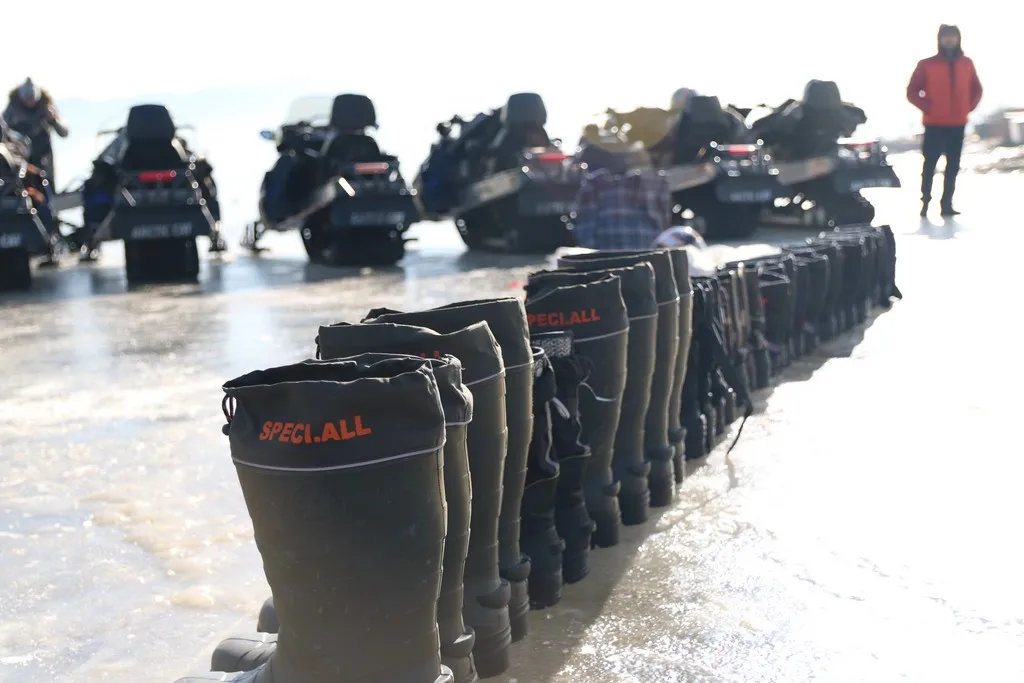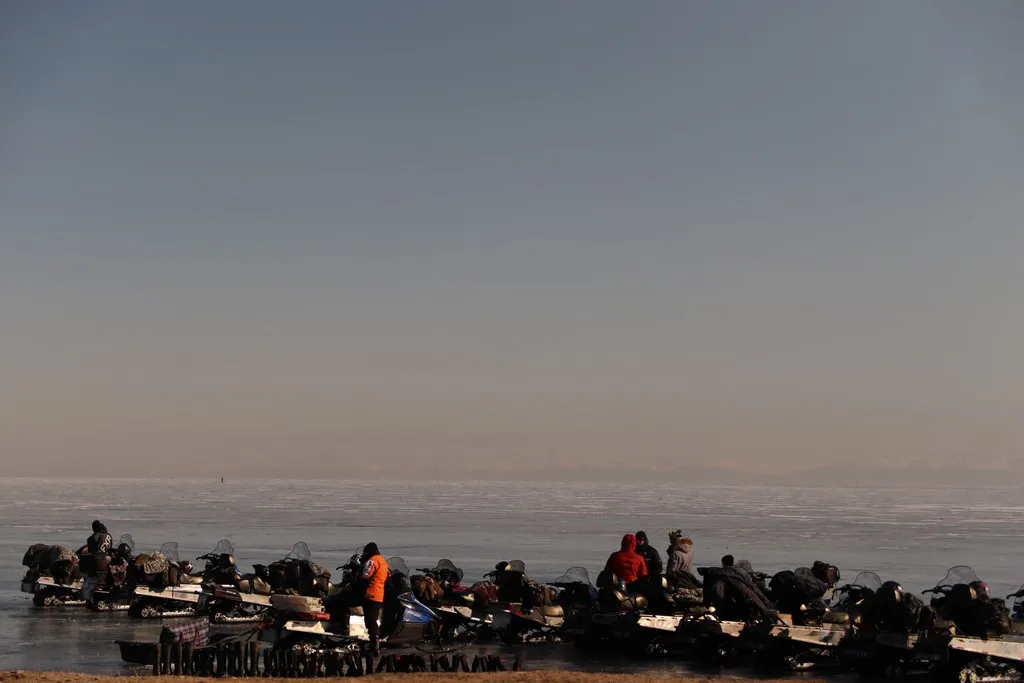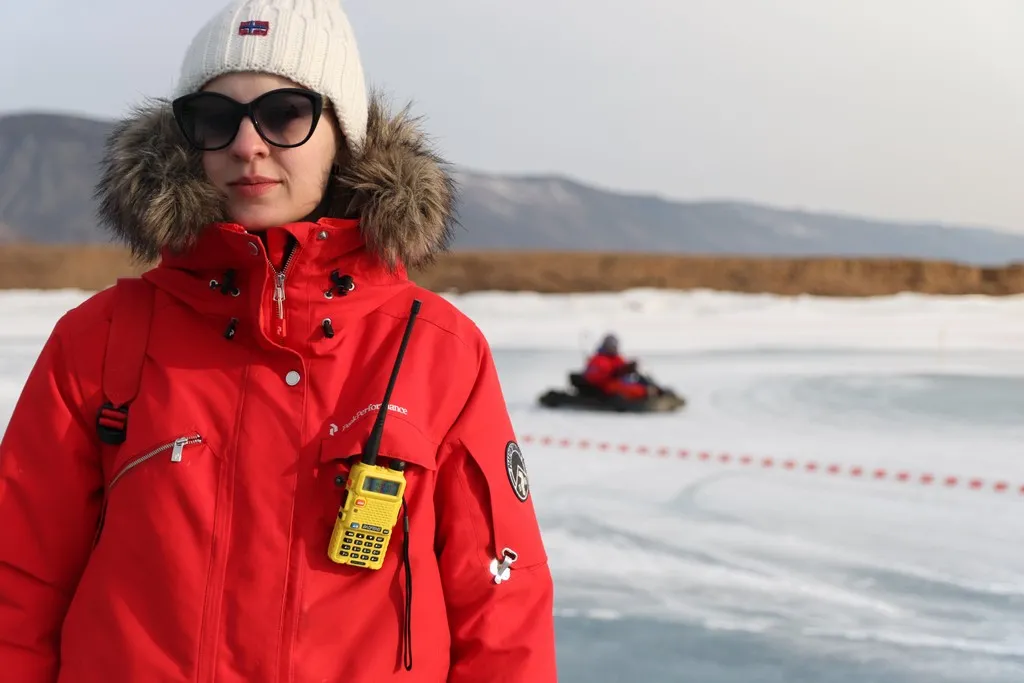For a month we had to organize an extreme Olympiad for programmers, a test drive of Cordiant tires and a family adventure in the taiga. I won't tell about each project separately, as I usually do all the applications of this season intersected and followed one after another. These three events are in one report.
For a group of 15 people it was necessary to organize something like an Olympiad. To cross Baikal from South to North, where every day was a new stage with the unique competition. The participants are employees of the company, which are engaged in developments in the field of information security.
We were responsible for the first three stages, where we defined as competitions snowboarding safaris, ski biathlon and speed races by karts. These are not playing cards, but racing cars.
We started preparing for the event in August. At the stages of negotiation of prices, selection of places, daily schedule and logistics we regularly had difficulties. We agreed on the place — we were out of the budget, leveled the price — the logistics fell down. It took four months to balance all the elements. Mostly it was the customer's fault.
There were two factors that complicated the work. First, the "organizing company" (we acted as an intermediary) did not have sufficient information about the infrastructure of the region, climate, distances and details of the organization of projects in this format.
For example, the task is to build a campsite on the ice 100 km from the nearest village. We understand that it is impossible to find the necessary equipment in Irkutsk — it simply does not exist. Everything needs to be bought and technically adjusted to our conditions — to make furnaces which do not burn out the air in the tent or the floor, which under the influence of heat of this furnace, by the morning will not turn into a raft in the middle of the lake.
We find equipment, we calculate the estimate, we work through logistics, we spend two weeks of time. The customer does not believe us that camping for one night may cost one and a half million rubles and makes requests to a dozen other companies. The process starts over again, there are ten more proposals that the customer is also not satisfied, and he again turns to us. Minus a month of time — the problem is not solved. And the same on each issue.
The second factor that slowed down the work was dozens of intermediary contractors. At some point, the work stopped because of it. Everyone started to call each other, trying to understand who was responsible for what.
If you are an event company and you do not know the region where you are taking a client, learn to trust your partner on the spot — this is the first option. The second is to come yourself, explore the area and organize by yourself.
Vladimir Nikolaev, General producer of the 211 Company
According to the program, a group of fifteen guests and two accompanying people were to fly to Irkutsk on February 27 at 8:50. After receiving the baggage, they were to hold a pre-launch briefing and have lunch in the center of Irkutsk. Then, they were to go by SUVs to the Village of Kultuk, change clothes, have instructions and go by snowmobiles on the ice of the lake to the Village of Listvyanka.
After spending the night in Listvyanka on the morning of the 28th, again going by SUVs towards Olkhon Island with a stop at the biathlon track. At 10 am the start of the competition, at 12:30 lunch, then off-road in the taiga and overnight on the Maloye More. The last third stage is on March 1, from 9 am until lunch, races by karts, in the bay near Olkhon Island.
Without putting us in the course, the organizer changed the time of departure from Moscow. Instead of 8:50, the group arrived at 11:25, which meant we didn't have time for a briefing and lunch. It was necessary to take guests to the village of Kultuk immediately after receiving the luggage, so that they could pass on snowmobiles 100 kilometers before dark.
We could not convince the customer to hold a briefing in the evening in Listvyanka and organize lunch on the ice during the safari. To save more time, we decided to hold a briefing at a restaurant across the street from the airport, and on the road Irkutsk — Kultuk the instructors drove instead of guests. The whole team responsible for the snowmobiles were supposed to move in the dark.
The stage was successful, but it was already dark in 40 minutes after the start, and for two hours the group moved on snowmobiles at dusk.
The next day we arrived at the biathlon track three hours before the arrival of the guests. Before the start, the instructor “combed” the track, set the shooting range, fired rifles and began laying out the skis and individual numbers. We had a time reserve until the organizer called me and said that they had already left and we need to start the competition earlier.
The group arrived forty minutes before the scheduled time. It would be uncritical if the representatives of the event agency relaxed a little. Apparently feeling responsible for the guests, they began to speed up the process of issuing inventory and numbers of participants. Someone mixed up the shoes, lost the sticks, there were not enough numbers — chaos was created where it should not have been.
The guests, staying in a great mood, looked at the spinning organizers, smiled and could not understand why they disturbed such a quiet morning. No one was interested in the size of boots, the length of the skis and the mark of ointment — people came to have fun and relax. We couldn't bring the idea to the colleagues that the situation is under control, every person is in his place and everything is according to plan. Their running did not accelerate anything, but only amused others. Although there were those who were strained.
When everyone was equipped, the group was escorted to the firing line, divided into teams and explained the rules. The guest mentor was the head coach of the Irkutsk region on biathlon Vladimir Misaylov. Before the start, the participants were given the opportunity to make test runs and shoot rifles.
We didn’t want to do a biathlon imitation, so after consulting with professional athletes, we did everything for real. Judges, penalty circles, rifles. The only thing we made easier was the length of the track and the distance to the firing lines.
Despite the fact that some of the guests hadn’t been on skis before, it looked professional enough. Fight, emotions, excitement. That what everything was intended for. After the competition, the judges did the calculation of the results, and the guests had dinner outside. Then everybody sat in the SUVs and went along the taiga road in the direction of Olkhon Island.
While the SUVs were swaying along the old logging road, our team transported racing cars and marked out the track for the races on the ice. By midnight, six karts were ready for the start and the silhouette of the track was outlined. In the morning it was necessary only to place the marking poles and cut ice cups to award the winners.
Feeling that the representatives of the event agency may have a desire to adjust the schedule again, we appointed a team meeting at 7:00 — an hour earlier approved in the general schedule. When we got a call in the morning and were told that the group was leaving earlier, we already had everything ready.
At 8:30 am, SUVs with guests parked next to us. The group was met by the President of the Motorsport Federation of Irkutsk region Stas Lyzhin and the organizer of the festival of extreme sports Baikal Rift — Andrey Surkov.
While Andrey entered the names of the participants in the standings and distributed the guests to the teams, Stas explained the rules and walked around the road every turn with the group, and the instructor filled the cars. The event girls also did not sleep and tried to introduce a new way of calculating the results — the one in which they compete all over the world seemed “somehow uninteresting” to them.
For three hours, the guests cut circles on the ice. We built a system of races so that each participant had the opportunity to drive the track on all five karts. So that at the finish no one could say, “Of course, John had a faster car!”
At 12:30, the three winners stood on an ice pedestal and got cups made of Baikal water. The size of each corresponded to the place won. This part of the event, for which we were responsible, ended. After the group sat in SUVs and headed for the North of Lake Baikal. Further along the route they were to spend the night on the ice, curling and hockey tournament.
When we were busy preparing the “Olympiad”, a girl from another event agency called me and asked for help with organizing a test drive of winter tires on the ice of Lake Baikal. She said that when planning the project, they made a mistake and did not take into account that leaving the ice outside the ice crossing is prohibited. They planned four races from March 5 to March 20, and not one of them geographically fell into the crossing zone. Our task was to help carry out the races and make it safe, both technically and legally.
The customer was in a difficult situation — several million rubles were spent, test cars and tires were traveling to Irkutsk on car transporters from all over the country, and the guests bought tickets. It was impossible to cancel the event.
The difficulty was that the organizers had already agreed the event with the customer and paid for the hotels. Before the start there were two weeks, we could not change the venue, it was necessary to adjust to the current conditions.
We warned the customer that they are unlikely to organize an event within the framework of the law — the Ministry of Emergency Situations with a probability of 99% will not agree on the selected places for a test drive. To make sure of this completely, we prepared a written appeal to the State Inspection and the Ministry of Emergency Situations in Irkutsk region. After its consideration, to our surprise, we were not refused, but invited to a meeting.
With the hope that it could be resolved, I went to a meeting with the inspector of the Ministry of Emergency Situations, 60 kilometers from Irkutsk. He invited me to the office and very politely began to explain how unsafe our idea was. He brought a couple of articles from the law that do not allow him to let us go on the ice. In the end, he added that since we decided to do everything according to the law and outlined in advance all the places where we plan to conduct a test drive, he would put out crews of various services there. But not to ensure our security, but to fine and tell the media how bad we were.
During the Russo-Japanese War, when the Western and Eastern branches of the Trans-Siberian Railway were not connected, rails and trains were laid on the ice of Lake Baikal. Today, only 11 kilometers of ice crossing are allocated for legal movement for 32,000 km2. Of course, everyone goes by cars, snowmobiles, buggies, heavy machinery, but officially it is prohibited.
During the conversation, it was felt like the inspector was worried about his place, which he would not want to lose due to an unauthorized event. The customer was ready to pay all the costs of the Ministry of Emergency Situations to ensure safety: the work of lifeguards, rental and refueling of equipment, logistics, accommodation and meals for the service staff. But in the end, our appeal was not agreed.
The customer was in a difficult situation — several million rubles were spent, test cars and tires were traveling to Irkutsk on car transporters from all over the country, and the guests bought tickets. It was impossible to cancel the event.
The laws regulating the departure on ice are made in such a way that only “special people” could move on ice but others could not. According to the law of the Ministry of Emergency Situations and State Inspections, we can only be warned that this cannot be done, but can not prohibit. This was explained to us by the lawyer whom we hired to resolve the situation if suddenly the control services start to “press” us.
About ten people were running around, someone was tormented with a flying tent, someone was holding sheets of plywood. It seemed that by the arrival of the guests the organizers would not have time to prepare the site.
To ensure safety, we have engaged a catastrophe emergency crew and prepared a technical assistance vehicle. Before the start, ice measurements were made and areas were selected where its thickness was not less than 70–80 centimeters. This is enough to sustain a tank division.
On March 5, the day of the first test drive, we arrived at the site. A strong wind was blowing, the tent that the organizers were trying to install on the ice was leaning to the right and to the left. A truck with a bio-toilet and a catering service arrived. There was an hour before the guests arrived. At this point, they took their seats in a hovercraft in the Village of Listvyanka, 15 kilometers from us.
About ten people were running around, someone was tormented with a flying tent, someone was holding sheets of plywood. It seemed that by the arrival of the guests the organizers would not have time to prepare the site. Most of all, it was alarming that there was no marking of the track on the ice. Although I saw the projects of three tracks: a snake, a straight, circular route with turns.
Hovercrafts began to park near the shore, 20 guests looked around trying to understand what was waiting for them in the middle of miles of pure ice. There were no tracks, the tent had been dismantled, the catering had not even warmed up the coffee machine. The wind was blowing, the temperature was about minus 20. People, like penguins, trampled on the spot for another half an hour trying to warm up, after which they began to sit in the queue in three Nissan X-Trail cars.
Sitting in a cozy technical SUV, chewing a sandwich with hot tea, it was a pity for the frozen people, and it was unclear what the organizers had gone wrong. Yes, there were difficulties with the "legalization" of the event, but why was everything so bad with the internal organization? Where were the warm tents? Where was the food? Where was the entertainment? Where was the track for a test drive after all? Races lasted from 10:00 to 16:00, all this time people were outside, from time to time driving cars back and forth. At lunch, they were fed a little and taken back to Listvyanka. It would be better if the company Cordiant did nothing at all than such a shame.
The next test drive was planned on March 10 with new guests. The organizers kept in touch with us, but hid their future plans. It seemed that they were trying to get contacts of SUVs, hovercrafts and people from us to continue to do everything on their own. Later it appeared that organizers found a contact of the person who promised them to resolve a situation with the Ministry of Emergency Situations and to move down a column on ice in the Village of Listvyanka. It is impossible to imagine more noticeable place than this one.
On March 10, we witnessed a circus performance performed by inspectors of the Ministry of Emergency Situations and the test drive team. At 10 am, a line of 7 Nissan X-Trail cars departed from the Mayak Hotel in the Village of Listvyanka and moved toward the exit on the ice. There at that time the crew of inspectors of the Ministry of Emergency Situations was already on duty, who blocked the exit with the UAZ car. After twenty minutes of altercations, the column turned around and went to another exit, opposite the Mayak Hotel. The inspectors were there, led by the one who refused me to hold the event.
In front of the guests, whom the Cordiant Company invited to Lake Baikal, there was a clownery. People who promised the organizers to resolve all issues with the Ministry of Emergency Situations, tried desperately to do this for an hour. As soon as we believed that the staff in uniform would remain adamant and the test drive would be canceled, the inspector, who so sincerely told me about insecurity, gave up and released a column onto the ice.
The further fate of the event is unknown to us, as well as the fate of the inspector, who broke the law, endangering the lives of 30 people. The organizers of the test drive, having felt themselves well on the spot, received the necessary contacts from us, decided to refuse further cooperation. Also along the way, they refused to pay the money, which we agreed before the start, arguing that now they do everything themselves.
Things happen.
A ray of buzz, in this rotten intermediary kingdom there will always be customers with whom we work directly. Here, also can be some problems, but in this situation, everything depends on us.
We planned to conduct an individual tour for two people from February 17 to February 21, but one of the two guests was not given a visa to Russia twice. A Belgian and British citizen with big business, with branches around the world, could not get visa to Russia twice. In a country where thousands of migrants without a guilder in their pockets come easily.
We can't tell a lot about this adventure — there was no trash, people rested and enjoyed. It’s boring and enviable to read about other people's joys, so I’ll just say about the features of the program and the things that we did for the first time:
- Tasting set of Baikal dishes. At our request, the chef of the restaurant Strizhi, has developed a five-course set. Now we use it to start all trips. We don't recommend that guests eat on the plane during the flight to Irkutsk in order not to clog the receptors with tasteless food. In the set: lightly salted chir with two types of potatoes, pressed cucumbers and caviar; cream soup with hot smoked omul; baked Baikal whitefish on a zucchini dranik with sour cream and mushroom sauce; filet mignon with spinach and truffle potatoes, bird cherry dessert with sour cream, pickled sea buckthorn and meringue with pine nuts.
- Safari on utilitarian snowmobiles around the City of Baikalsk. Before I was skeptical about this area, because it had never been famous for it. Usually for snowmobiles are the Listvyanka area and the Mamai Mountain. But since the guests still had half a day on the second day after skiing in Baikalsk, they decided to arrange a two-hour walk through the taiga with a trip to the ice of Baikal. Guests liked it — we will add to the arsenal from the next season.
- Masterclass on mountain snowmobile riding. Mountain Mamai is the best place in the region for a mountain snowmobile and the guests, though wary, decided to try it. The whole day they stormed the two-meter virgin soil and dug out the snowmobiles. It was the emotional high point of their adventure. After skiing, they were inspired to return home to do skiing. After Mamai, each of them bought a mountain snowmobile in their dreams.
- Taiga banya. The last four years, a banya in our adventures in the top services. Usually we rent a bath complex, we bring a bathhouse attendant and a masseur, we prepare brooms, ointments, mud, and oils. During Tatyana's tour on the first day, it was such a banya. We included wild taiga banya on Mamai only to warm up the guests after masterclass on snowmobiles. Cold dressing room, no light, no table — room 3 for 3 with a stove and a bench. Everything is Siberian minimalist and harsh, but the guests liked this format more than the bath with the “golden tinsel”.

This place is now in the top 5 of my favorites.
Mamai Mountain is a mecca of free riding and one of the most snowy places in Russia. According to our cool guides, less than 150 tourists a year get to this place, firstly it is far, secondly it is expensive.
For me, this is a real luxury to visit this place and discover mountain snowmobiles. The mountain belongs to professional free riders, who miraculously built a couple of chalets here and kindly rent them out. We were absolutely delighted with the trip and after we managed to go to a real taiga banya. I still don't believe that we did it.
We had been planning this journey for so long that we can’t believe that it had already happened. Without professional help, it would be very difficult to see what we saw. Thanks to the guys from @211company for our individual haute couture tour.
In the winter of 2019, we organized another Heliski in Kamchatka and a 23-day adventure in South America. I’ll tell you about these programs separately, but for now see the report video from Baikal.

















